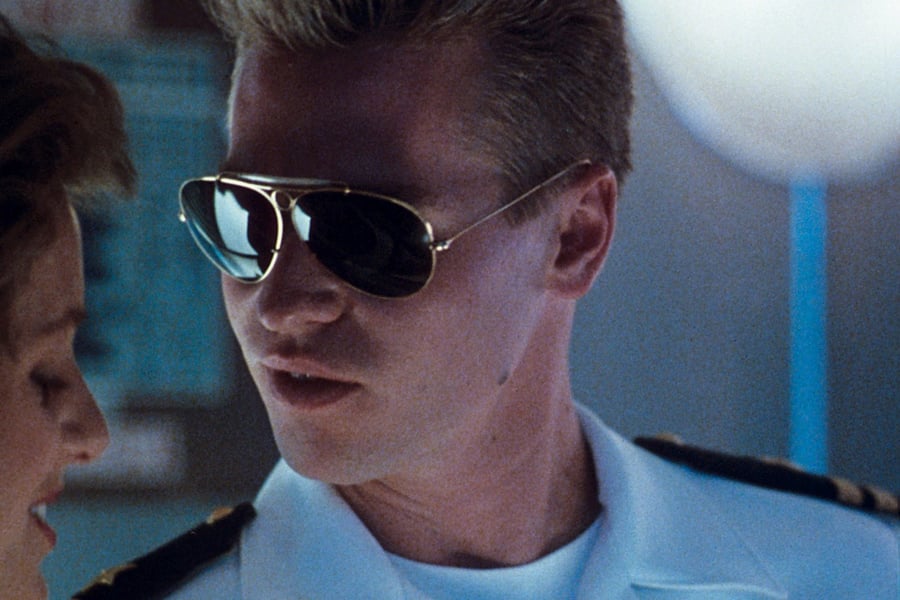It’s not hard to imagine a topsy-turvy, role-swapping alternate reality where Val Kilmer plays Pete “Maverick” Mitchell in 1986’s Top Gun and Tom Cruise is cast as Tom “Iceman” Kazansky. Kilmer’s Maverick would be cocky but also raw, exposed. Good at what he does but a desperate wreck at everything else. Kilmer’s specialty was giving the audience glimpses of intellect and compassion behind his steely gaze.
Cruise, on the other hand, could never have pulled off Iceman. Cruise was too much his lead character: an immature hotshot with a shit-eating grin. His Iceman would likely join the pantheon of Eighties bullies and one-dimensional uber-jocks — Johnny in The Karate Kid or Craig Sheffer in Some Kind of Wonderful.
No offense, Tom. You’re good at what you do (like running very, very fast), but Kilmer had range. And his Iceman had depth — he was funny, mysterious, swaggering. Dangerous but a professional. Iceman is the moral center of the movie’s gung-ho universe who gets the big cheer at the end when he acknowledges that Cruise’s Maverick, a fantastic brat, has grown up and has earned the right to “be his wingman anytime.” Maverick could never enter flyboy Valhalla without Iceman’s pre-battle blessing.
Kilmer, who died yesterday at 65 from pneumonia after a long battle with throat cancer, was an actor who glowed, a low-key L.A. sun god who was approachable and warm. When we first meet Iceman, he’s contemptuous of Maverick despite his love for Goose, Mav’s life partner, played by lanky goof Anthony Edwards (in every dimension of the multiverse, Edwards is Goose because he’s that good). Iceman is a warrior with instincts; he senses that the new guy isn’t just a loose cannon but a liability. In corporate HR parlance, he’s not a “team player.”
Kilmer is in Top Gun for all of 10 minutes or so. He is a supporting character, alongside old bulldogs like Tom Skerritt and Michael Ironside. But he steals every scene he’s in. Why? Val Kilmer was a movie star and a unique actor who balanced two distinct vibes: easygoing beach bum and “heavy is the head that wears the crown” Adonis. His intensity was always tempered with a natural decency. At his best onscreen, he’s a Zen master fighting the good fight, a chill dude with a medium fuse. His performance in Top Gun proves the hoary old thespian adage that there are no small parts, just actors who aren’t as good as Val Kilmer.
Kilmer’s career spanned nearly four decades, starting with his first movie in 1984, the absurd joke-a-minute World War II parody Top Secret!, from the knuckleheads that created the comedy classic Airplane! He’s the lead, a good-looking rocker with a perfect straight face.
A year before Top Gun, Val Kilmer starred in the best John Hughes movie precisely because it was not directed by John Hughes, Real Genius, where he turns in a Bill Murray-level performance as a brilliant rogue at a fictional West Coast engineering school. Directed by Martha Coolidge, Real Genius is horny, silly, and devoutly countercultural, all anchored by a handsome star with a twinkle in his eye. That Kilmer jumps from comedy to action is early proof of his versatility. No matter the genre, he was always vulnerable and accessible.
Love Music?
Get your daily dose of everything happening in Australian/New Zealand music and globally.
A few years after Top Gun, Ron Howard and George Lucas tried to turn Kilmer into Han Solo in their fantasy adventure Willow. The movie was an unfortunate bomb (also a cult favorite), but Kilmer is fantastic as a rogue with a sword. Then red-hot director and Baby Boomer chronicler Oliver Stone cast him in his feverish rock biopic The Doors as mercurial pop-music sex-and-drugs freak Jim Morrison. Kilmer is incredible as The Doors‘ lead singer, fleshing out the infamous crooner’s persona.
In the forgettable 1994 indie rom-com Sleep With Me, writer-director Quentin Tarantino goes on a memorable, if dated, rant about Top Gun‘s homoeroticism, which likely felt transgressive at the time. That there’s a sexual charge between Cruise and Kilmer is evident; their scenes stand out because these two gorgeous, charismatic hunks have chemistry. Their relationship is romantic in a platonic sense, yet there is also nothing wrong with shipping these two — God bless.
Top Gun is, first and foremost, a shameless Reagan-era guitar solo of a commercial for American military might, a work of blatant warmongering propaganda. It’s also, secondly, a movie about men in love — with their toys, country, and each other. These guys are all brothers, a chosen family. Who amongst us doesn’t play volleyball shirtless with our siblings?
Thirty-six years later, Kilmer and Tom Cruise reunited as Iceman and Maverick in Top Gun: Maverick, Cruise’s triumphant sequel. There is a brief scene between them: Iceman is an admiral, and Maverick is almost exactly where we left him, emotionally and professionally, in the original his career saved by an old friend. Wingmen forever.
One had changed while the other stagnated. In his office, in a raspy voice, Iceman inspires his bro to let go of things he can’t control, like the throttle of a fighter jet. At first, Kilmer’s Iceman communicates by typing words on a computer screen, but his voice was recreated using AI.
Kilmer was diagnosed with throat cancer in 2014, and his road to recovery was long and hard. He struggled to speak due to the treatments, especially after an emergency tracheotomy. His scene with Cruise is moving, both because it highlights the fictional bonds between two former rivals who became friends and also because here are two middle-aged celebrities plying their trade — one at the top of his game, still strong-looking at 59, the other weaker, wearing glasses, 62 years old, a scarf wrapped around his neck, but brave, defiant even. And he still glowed.
From Rolling Stone US



































